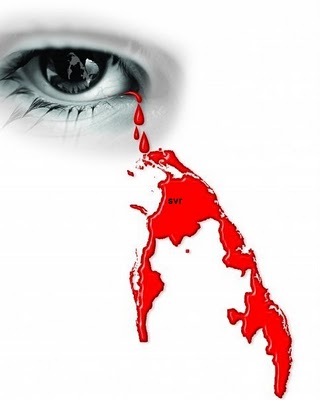
87 of 115 representatives of the Transnational Government of Tamil Eelam (TGTE) already declared elected from 11 countries are meeting in three spots of the world, in the US city of Philadelphia, in London and in Geneva, in a 3 day inaugural session from 17 to 19 May. The Tamil Eelam flag was hoisted and a representative from each country addressed the public stating that the goal of the TGTE should be the formation of independent and sovereign state of Tamil Eelam in the North and East of the island of Sri Lanka. William Ramsey Clark, a former US Attorney General, was one of the keynote speakers of the inaugural event. He characterized the move to form the transnational government a "brave initiative to find the wisdom and the courage to achieve - as it was for many centuries - a free and independent Tamil Eelam."
The 82-year-old Ramsey Clark, who was a prominent figure in the anti-Vietnam War moment, had functioned as the Election Commissioner of the TGTE elections in the USA.
"I need to tell you that your challenge is enormous […] Freedom is possible. But you have to work awfully hard at it. And you have to be right. You have to convince other people that you are right. […] You need to know your history. You need to persist your history and need to have your history understood that you were a uniquely different people than the Sinhalese on the same island," Clark said.
"Resolve your differences together openly and frankly wherever it occurs outright and quickly, and abide by the agreement
that you reach," Mr. Clark said elaborating how the American nation was made possible with unity as an unprecedented force to achieve independence. "To divide and conquer a dispersed people is an easy thing to do," he warned.
Francis Boyle, a professor of international law, Domach Wal Ruach, the secretary general of Sudan People’s Liberation Movement (SPLM) USA and Janani Jananayagam, a British Tamil activist engaged in awareness campaign on Tamil genocide were the other speakers in the inauguration ceremony.
Congratulating the members of TGTE, Domach Wal Ruach of the SPLM-USA said: "Although results are not seen overnight, I think what you have done now is a step towards right direction. We have been there and we are getting close to it now. The struggle is not easy. There are setbacks. But, you have to be steadfast. You owe it to the young generation. They are coming to you. If you don't do it now, no-one else would do it and the entire generations would be
lost."
"I want to tell you that, through collective work, diaspora is one of the component. Our leader commanded the largest single rebel groups ever. And yet, we were not able to win, militarily," he said and added: "The most important organic guarantee that you could always have, is your diaspora." Explaining the history of the Sudanese struggle and how the SPLM organized the diapora in grass-root level.
He further claimed that the US had done magnificent help to Sudanese. "I don't think we could have done this without the United States of America," he told the TGTE members who were gathered at the Philadelphia National Constitution Centre (NCC): "They helped us so much. I want to thank them again once more. The peace agreement is still unimplemented, but we are hopeful that in January next year, we will be an independent state," he said. "That has cost us 2.5 millions of peoples lives, dead."
Professor N. Sriskandarajah, a member of the advisory panel, who invited the elected members of the TGTE for the inauguration meeting, had set the agenda for the session. In an invitation to the elected, Prof Sriskandarajah had outlined the following agenda in advance: "The elected body will be transformed into a Constituent Assembly, an Interim Chief Executive and a small executive committee to manage this process elected, important themes for the Constituent Assembly discussed, agreed on and teams created, and a number of working groups for important and immediate tasks also elected."
The main venue of the event was changed from London to Philadelphia in short notice. However, virtual participation through video conferencing from London and Geneva has worked satisfactory on Monday as it was a session of presentations.
"Despite the issues of sectarian politics involved in the pre-formation process of the democratic exercise and the conceptual concerns, the people have had their say in electing their representatives. The representatives have also clearly expressed what they stand for in their addresses. It is now up to the elected to prove their credibility in the formation process," commented a diaspora analyst, following the developments.
The inauguration commenced at 13:00 on Monday and is scheduled to conclude by 13:00 on Wednesday.





